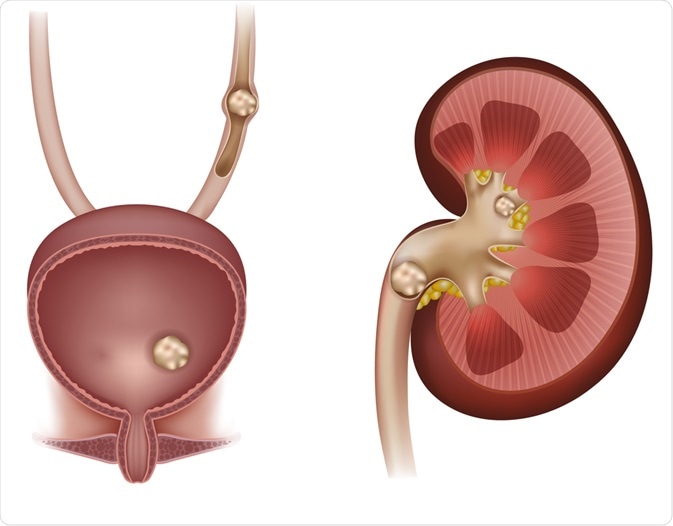Urolithiasis is a term used to describe calculi or stones that form the urinary tract. This condition involves the formation of calcifications in the urinary system, usually in the kidneys or ureters, but may also affect the bladder and/or urethra.
Urolithiasis is a common condition that with various risk factors and causes, including lifestyle habits and other practices.

Image Credit: Tefi / Shutterstock.com
Epidemiology
Renal stones are a common health condition; in fact, it is estimated that up to 10% of all individuals will develop a kidney stone throughout their lifetime, although some individuals do not experience symptoms. Each year, approximately 1 in every 1,000 people is hospitalized due to urolithiasis.
Men are more likely to have urolithiasis than women, with a risk ratio of 3:1, although this gap appears to be narrowing over time. People between the ages of 20 and 40 years are at the highest risk of developing stones.
Risk factors
The risk of urolithiasis increases as a result of any factor that leads to urinary stasis due to a reduction or obstruction of urinary flow.
Certain risk factors contribute to a higher incidence of stone formation. For example, men excrete less citrate and more calcium than women, which is thought to be linked to the higher incidence of urolithiasis in men. In addition to sex, an individual's ethnic background can be considered a risk factor, as individuals with a Native American, African, or Israeli background are more likely to be affected by the condition.
A family history of the condition may also promote stone formation in offspring, as some families appear to have a tendency to produce excess mucoprotein in the urinary system. Additional aspects of the patient's medical history, such as the presence of certain intestinal diseases, recurrent urinary tract infections, and cystinuria, can all increase an individual's risk of stone formation.
Dehydration or reduced fluid intake may increase the risk of stone formation, in addition to a diet that is high in sodium, oxalate, fat, protein, sugar, unrefined carbohydrates, and vitamin C. In addition to diet, certain regions of the world are associated with an increased risk of urolithiasis, such as tropical climates, mountainous or desert terrain.
Certain medications like ephedrine, guaifenesin, thiazide, indinavir, and allopurinol may lead to the development of stones.
Kidney stones (nephrolithiasis) - an Osmosis Preview
Symptoms
The exact symptoms of urolithiasis depend on the location and size of the calculi in the urinary system. General signs and symptoms may include:
- Renal or ureteral colic
- Blood in the urine (hematuria)
- Urinary tract infection
- Abdominal pain
Stones in the kidneys can obstruct the urinary flow in the kidneys or the ureters, which can lead to severe flank pain and possibly blood in the urine. Stones in the bladder can lead to symptoms such as pain, as well as an increased urge and frequency of urination.
Diagnosis
The diagnosis of urolithiasis involves a medical history and a physical examination, in addition to appropriate testing methods to identify the calculi and make the appropriate treatment decisions.
Additional diagnostic tests may include:
- Urine culture and urinalysis to reveal signs of hematuria, pyuria, infection and acidity.
- Complete blood count tests to detect elevated white blood cells indicative of infection.
- Intravenous pyelography (IVP) to identify the size and location of the stone and its effect on the urinary flow.
- Computed tomography (CT) scan to visualize urinary tract and any obstructions such as in acute renal colic.
- X-ray imaging to identify the size and location of the stone.
- Renal ultrasound to screen for stones and detect obstruction in the urinary system.
Management
The management of urolithiasis will depend on the specific patient case, based on factors such as the presenting symptoms and the size and location of the stones.
Most stones are excreted in the urine on their own and do not require invasive surgical techniques. Keeping hydrated to flush the stones out of the body is recommended initially if the pain is manageable for the patient. Simple analgesic medication such as paracetamol can aid in pain relief.
In an acute situation, analgesic medications such as nonsteroidal anti-inflammatory drugs (NSAIDs) or codeine can be administered to relieve pain. Antiemetic medications and rehydration therapy may also be useful. Medical expulsive therapy can be used to facilitate the passing of the stone. For larger stones that do not pass spontaneously, surgery may be needed to remove the calculi.
References
Further Reading
Last Updated: Jun 18, 2023